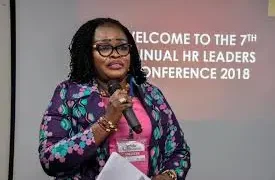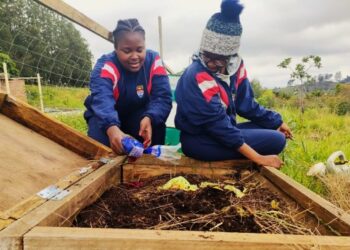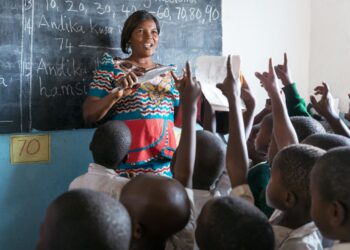
On June 25, 2024, at 4:06 PM, I received my certificate of completion for a short but essential course: The UN Convention on the Rights of the Child, Sustainable Development, and the Law. On September 10, 2024, at 6:25 PM, I earned another certificate for completing The Sustainable Development Goals and the Law short course, both from the University of Cambridge, UK. These milestones marked a pivotal moment in my perspective, reshaping how I view education, my teaching career, and nearly two decades of work through the lens of sustainability, human rights, and well-being.
This transformative journey inspired me to reflect on how we’ve been teaching our students for the past 15 years, focusing primarily on passing exams like WASSCE and NECO, often neglecting to prepare them for the challenges of shaping tomorrow’s world. The reality has dawned on us: it’s time for a paradigm shift.
As we stand at the crossroads of environmental urgency and technological advancement, the future of work is evolving rapidly, and our educational curriculum—from pre-primary to tertiary—must adapt accordingly. Green careers are no longer just a trend; they signify a fundamental shift in how we approach our educational policies, Teacher training, Curriculum planning, relationship with the planet and our collective future. With artificial intelligence and automation reshaping our traditional job markets, equipping students for these green careers is essential to prepare them for meaningful and sustainable roles in the future workforce. This piece combines my personal views with insights from my courses and other readings. It explores key strategies that schools can adopt to prepare students for a future where environmental stewardship and innovation are central to the green economy.
Understanding Green careers
As we navigate the future careers, the growing field of green jobs offers exciting opportunities to make a real difference. Green careers are roles that focus on environmental sustainability, helping to address challenges like climate change, resource depletion, and pollution. These professions are found in fields which include waste management, green building, sustainable agriculture, sustainable education, renewable energy, environmental conservation, environmental engineering, solar energy, and climate research. Green occupations also involve positions in community outreach, education, and policymaking. For example, you could work as a conservator to save natural areas or as a sustainability consultant to assist companies lower their carbon footprint. The good news here is that there are opportunities for students with different skills and interests.
Emphasis on Interdisciplinary Learning.
These career preparations require expertise from multiple fields such as science, social sciences, technology, economics, and even the arts subjects, all play a role in addressing environmental issues. Our schools can encourage students to engage in projects that merge technology with environmental science, such as developing energy-saving apps or innovative recycling systems. This kind of project can help prepare them for future roles. Also, to enhance their expertise, schools can motivate students to watch videos on topics like solar technology, sustainable construction or environmental management. These clips provide them with hands-on experience and make them more ready for the competitive job market.
Integrating Soft Skills and Technology.
Green careers require more than just technical expertise—they demand strong soft skills like communication, teamwork, and problem-solving, which are essential for collaboration and advocacy in sustainability projects. Schools can help students build these skills by assigning group presentations to students on local environmental issues, promoting teamwork while also advocating for environmentally responsible practices. At the same time, the rise of AI and smart technologies offer new opportunities for students in sustainable invention. From optimizing energy consumption to developing smart waste management systems, technology plays a crucial role in driving sustainability.
Nurturing Innovation and Real-World Connections
Sustainability thrives on innovation, and encouraging students to think creatively is key to developing groundbreaking solutions and sustainable business ideas. Schools can spark this entrepreneurial mindset by hosting competitions where students pitch eco-friendly business models, such as biodegradable packaging or energy-efficient devices. These activities not only foster creativity but also inspire students to transform their ideas into impactful green ventures. In addition, building partnerships with green organizations—such as businesses and nonprofits focused on sustainability—can offer valuable insights and networking opportunities. Schools can develop connections with local green organizations and facilitate internships or volunteer roles, helping students gain hands-on experience. For example, The Nature Conservancy provides opportunities for students to work on conservation projects, while World Wildlife Fund (WWF) offers educational partnerships focused on global sustainability challenges. Additionally, Greenpeace and 350.org offer advocacy-focused experiences, while EcoLogic Development Fund works on projects related to sustainable community development in Latin America. Internationally, programmes like UNESCO’s Nature’s Classroom, an educational initiative set in the Bolivian Amazon, and Earthwatch—which partners with schools and universities to conduct hands-on environmental research—provide excellent examples of how such partnerships can enrich learning and inspire real-world environmental action. By combining creative thinking with practical experience through such collaborations, schools can better prepare students for careers in the growing field of sustainability.
A Call to Action
Charity begins at home. Schools that engage students in local environmental efforts, foster a sense of responsibility and connection to their communities. They can organize community clean-ups or tree-planting drives, allowing students to see the immediate impact of their contributions. Creating environmental policies shape the green economy and teaching students about environmental law and advocacy empowers them to drive change at all levels of governance. Not every child in Nigeria should be expected to study law or medicine; we can change this narrative. Careers—such as school sustainability officers, renewable energy technicians, sustainable architects, and environmental policy analysts—are not merely jobs; they are pathways to building a better future. Let’s inspire the next generation to rise to the challenge, embracing the opportunities of a green economy while championing a healthier planet. Governments and other stakeholders should intensify effort in this area and encourage their participation in policy discussions or environmental campaigns.
References/ Further Reading:
The Nature Conservancy – https://www.nature.org
Offers a variety of educational resources and opportunities for students to engage in conservation projects globally.
World Wildlife Fund (WWF) – https://www.worldwildlife.org
Focuses on biodiversity and climate change, providing educational programs and resources for schools to integrate sustainability into the curriculum.
Greenpeace – https://www.greenpeace.org
Known for environmental advocacy and activism, Greenpeace offers opportunities for students to get involved in campaigns and initiatives promoting global sustainability.
350.org – https://350.org
A global grassroots movement working to address climate change, with opportunities for students to participate in activism and awareness-raising initiatives.
EcoLogic Development Fund – https://www.ecologic.org
Focuses on sustainable community development in Latin America, providing students with hands-on opportunities to work on conservation and sustainable development projects.
Earthwatch – https://www.earthwatch.org
Provides students with opportunities to participate in environmental research projects and gain field experience in sustainability.
UNESCO Nature’s Classroom (Educational Forests in the Bolivian Amazon) – https://www.unesco.org/en/articles/natures-classroom-educational-forests-bolivian-amazon?hub=72522
UNESCO’s educational initiatives focus on immersive environmental learning experiences, such as the Nature’s Classroom program, aimed at fostering sustainable development through experiential education.
__________________ Oluwatosin Osemeobo is a passionate lifelong learner, writer, sustainability advocate, and educator with over 15 years of experience in teaching and a strong background in education. He holds a Bachelor of Education from Obafemi Awolowo University (OAU) and a Nigeria Certificate in Education from the College of Education, Zuba. His academic achievements include certifications in Inclusive Leadership from the Open University, UK, and Sustainable Diet from the United Nations Climate Change (UNCC) programme. Additionally, he has earned prestigious certifications from the University of Cambridge in areas such as the UN Convention on Child Rights, Trade Rules, Sustainable Development, and Law, among others. Tosin designs and leads initiatives that use schools as a catalyst for sustainable development and teacher wellbeing. He is the President and Convener of When TEACHERS Pray, a global virtual platform dedicated to the spiritual wellbeing of school communities. Through his writing, advocacy, and community engagement, he empowers schools worldwide to adopt sustainable practices, fostering a future that is socially just, equitable, and environmentally conscious. He is currently living and working with a School in Abuja, Nigeria. Email: tosemeobo@gmail.com Phone: +234 806 561 1550


















































































 EduTimes Africa, a product of Education Times Africa, is a magazine publication that aims to lend its support to close the yawning gap in Africa's educational development.
EduTimes Africa, a product of Education Times Africa, is a magazine publication that aims to lend its support to close the yawning gap in Africa's educational development.